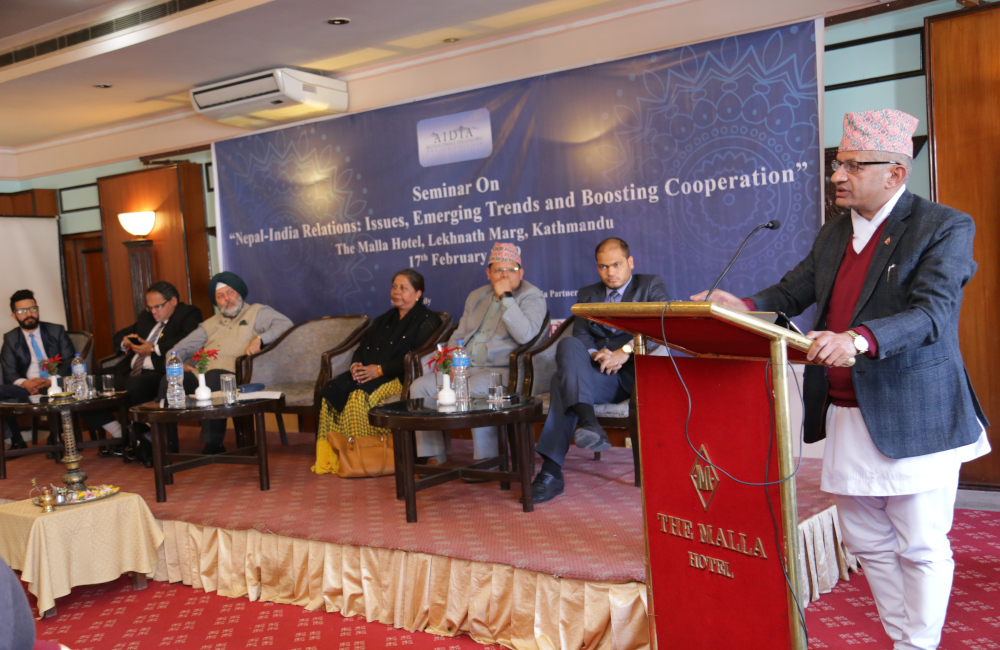2019-02-18

Kathmandu, 18 February (2019) – Minister of Foreign Affairs Pradeep Kumar Gyawali has said that Nepal and India have broader potentials of collaboration in areas like infrastructural development which is key to socio-economic development, hydropower, and tourism, cross border railways, roadways and inland waterways.
Speaking at a seminar titled “Nepal-India Relations: Issues, Emerging Trends and Boosting Cooperation” organized by Asian Institute of Diplomacy and International Affairs (AIDIA) on Sunday, he said, “Terrorism has become a serious challenge in south Asia which needs higher level of collaboration between the countries.”
The speakers in the programme emphasized on the need of maintaining ties between India-Nepal for prosperity and development in the region.
Highlighting the importance of Indo-Nepal relations, Dr Manish Thapa, Research Professor, Institute of International Relations at University of Warsaw, said that Nepal and India are naturally parts of a family and the mutual relationship is complicated due to various opinion makers.
He said that Indian Prime Minister Narendra Modi’s four visits in five years to Nepal have created both hope and despair.
Commenting on the weaknesses in Nepal-India relations he said that the academic sector is yet to work seriously in understanding the relationship between the two open-border states. “The academic institutions are making opinions about Indo-Nepal ties merely by reading media contents, which is unfortunate.”
Dr Dattesh Prabhu Parulekar, Assistant Professor at Goa University, was of the opinion that Nepal-India ties are based on mutual respect and shared prosperity. “The new initiative of inland waterways connectivity between Nepal and India has unfolded a new chapter in India-Nepal ties beyond the border,” he said. While highlighting the challenges in the ties he said that there are various external powers polluting the relationship among nations in south Asia.
Commenting on South Asian Association for Regional Cooperation (SAARC) he said that it is not be all and end all forum in south Asia. He stated that Nepal and India shouldn’t be stuck in SAARC only but also need to look to other forums.
Manjeev Singh Puri, Ambassador of India to Nepal, said that Nepal and India have extraordinary people-to-people relationship. He said, “India is one of the fastest growing economies in the world and in 10 to 15 years India will be within top three largest economies in the world. That is why Nepal should think about ways to getting benefits from Indian economic growth. He also stressed on need of facilitating dialogues to strengthen the age-old relations.”
Chitra Lekha Yadav, former minister, was of the view that cross-border crimes like terrorism, fake currency, human and drug trafficking need to be dealt with seriously. “These issues have potential to influence our relationships. Our efforts should be on limiting cross-border crimes to maintain healthy relationships between the two states and for peace and prosperity in the region.”
Shyam KC, Research and Development Director of AIDIA said, it is evident that Nepal and India share plethora of partnership avenues but at the same time it is also necessary to have pragmatic policy approach and mechanisms for balancing widening trade imbalances, expediting cross-border connectivity, effectively addressing security issues, analysing unfolding developments in the regions among others for deepening the bilateral cooperation. He added that this was the primary objective in hosting the seminar.
Published on Lokantar